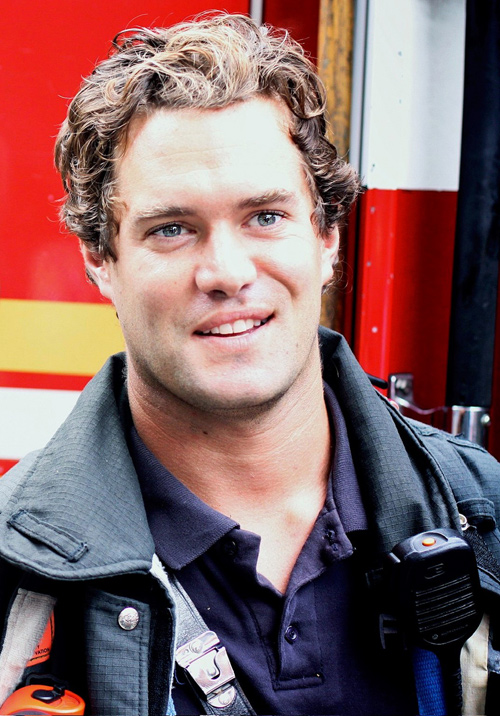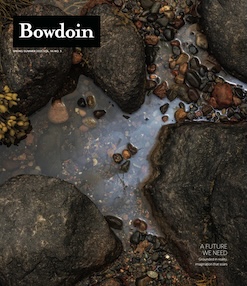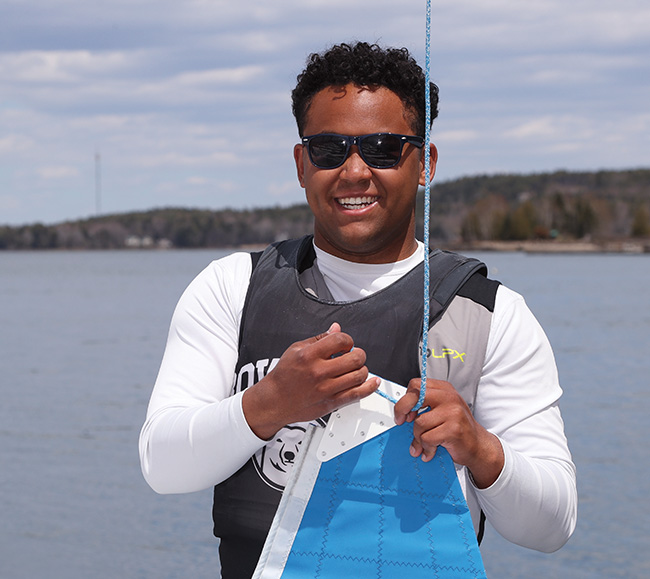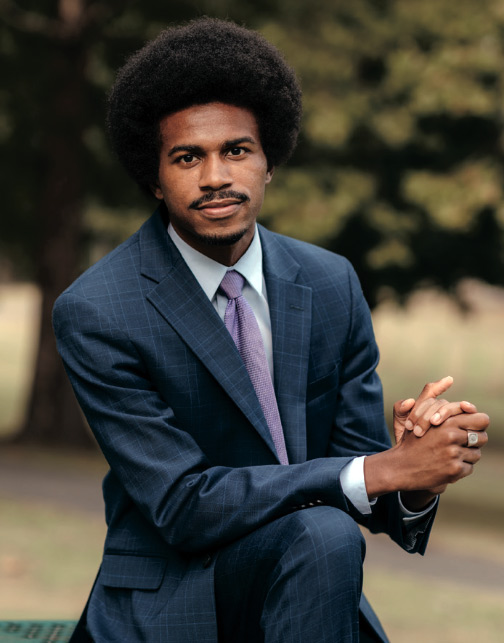Caught
By Sarah Lovely ’02 for Bowdoin MagazineReturning from camp pickup with four ravenous kids on a steamy August afternoon in 2024, I spied an unassuming package on my stoop.

Mindlessly, I tore it open. Rather than the back-to-school supplies I’d expected, I discovered a personalized copy of Ed Byrne’s new book, In Whom I Am Well Pleased. Adorning the cover was the all-American senior photo of my dear friend Matt.
Cracking it open, I quickly became paralyzed by the first chapter, which revealed, in painstaking detail, the final hours before Matt took his own life in 2014.
Tears flowed as I was transported to a different steamy August afternoon, twenty-six years earlier. That day, I’d left my room in Appleton to fulfill my first rite of passage as a Polar Bear: snapping my ID photo. Entering Smith Union, with a low ponytail that could’ve made the Founding Fathers proud, I noticed in my periphery a tanned aura and turned to see Matt Byrne. He looked as though he’d been plucked straight out of central casting for Baywatch. As I learned later, I was not alone in recognizing Matt’s allure—in a nod to Top Gun, his roommates had apparently already dubbed him “Iceman.”
Immediately, we struck up an effortless conversation; Matt’s striking looks belied his goofy laugh, making him at once utterly enchanting and disarmingly approachable. We were delighted to learn not only that we were both swimmers, but also that our dads had entered Bowdoin together in 1969. Once we started swimming together, I realized a simple truth: hang around someone long enough clad only in bathing suits, and you will be rewarded with true friendship.
Back in my kitchen, I devoured Ed’s book, which oscillated between Matt’s idyllic upbringing and his gut-wrenching struggles with trauma and addiction. There were times when Ed highlighted qualities of the Iceman I knew, my memory filling in the gaps: self-assured Matt, wearing green corduroys and a yellow sweater vest for our team’s twelve-hour journey to Hawaii because “my mom insists we dress up on planes.” Laid-back Matt, who, a year later, spent two weeks prior to our training trip surfing Hawaii’s North Shore and, legend has it, subsisting entirely on a ten-pound bag of rice. Disciplined Matt, whose life as a distance swimmer made him a confident Jones Beach lifeguard. Whimsical Matt, who led our cult-like team in endless renditions of “Kung Fu Fighting” in Theta’s sticky basement. Faithful Matt, who, no matter what transpired the previous night, never missed Sunday mass.
As Ed described Matt’s agonies, I reflected on something I had buried: the drift in our relationship during our senior year. As we each confronted our own hurdles, our rock-solid friendship sprouted boundaries, which I attributed to the transition from wide-eyed innocence to adulthood. I realize now that, in oversimplifying things, I failed a rudimentary test of any good English major: I hadn’t investigated Matt’s sub-text. Ed’s book provided the missing context: as I wrestled with uncertainty that year, Matt was busy solidifying his life’s purpose.
We were seniors when, on a perfect Tuesday morning, the world crumbled. Whereas the wake of 9/11 left me devastated, Matt was called to action. That day changed his life’s trajectory, leading him straight into the most selfless—and trauma-inducing—of careers: that of a New York City firefighter.
Reading well into the night, I found my relationship with Matt deepening, as facets of him surfaced that I’d never known: his heroism in battling Manhattan’s deadly Deutsche Bank fire; his heartache as two children died in his arms on the streets of Chinatown. As I read descriptions of his family’s anguished attempts to liberate Matt from the grips of addiction, I recalled the unabashed tenderness with which he regarded his siblings and parents. Seeing Matt through the lens of these inconceivable circumstances, I became convinced that he was a casualty of the very event that defined our senior year. Through his steadfast service to others, he so completely embodied a commitment to the Common Good.
Five months after I finished IWIAWP, many once-inseparable swimmers from our era returned to Greason Pool for an alumni meet. Tears welled as I watched the newest generation of Polar Bears scream cheers that Matt once conducted. Afterward, we gathered in a Brunswick restaurant and remembered our friend. Instead of discussing how Matt died, we traded stories about how charismatically he lived.
In Whom I Am Well Pleased does not attempt to generalize or remedy the complexities of addiction, mental health, or suicide. Instead, Ed invites the reader into his vulnerability and turmoil, offering an antidote to society’s instinct to stigmatize such matters. As I finished reading, I had two revelations. First, courage comes in shapes both obvious and subtle. Second, I know exactly from whom Matt inherited his bravery.
This excerpt from chapter twenty-three of Ed’s book—Matt’s story—contains references you might have to read the book to understand. But you can’t miss the important part either way: a cherished son, lost to trauma and gone too soon, leaving a hole in many lives. I think this excerpt will give you an idea.
An excerpt from In Whom I Am Well Pleased, Chapter XXIII
I have good news and bad news for you, if you ever must go through an ordeal like the death of a child from a socially unacceptable cause, e.g., suicide or overdose.
The bad news is that some people think tragedy and sorrow are contagious, so they shun you and keep their distance for fear of catching it. Some of these people you considered friends, and you thought they would be there for you when you needed them. It’s very disappointing to learn how badly you misjudged some people and gave them credit for compassion they either didn’t have or for some reason were incapable of showing.
The good news is that those fair-weather friends will be replaced, one by one, by people you didn’t realize cared for you. It’s almost like some cosmic balance must be kept, but unexpected people step forward, and you end up with the same number of people you thought might help you get by, although the group is differently comprised.
One unforeseen group came to the rescue immediately after Matt’s funeral, before the letdown following that day’s activities could fully set in. His former supervisors at Jones Beach called and invited us to attend a memorial “Paddle Out” service they would be holding at 8:00 a.m. on Labor Day morning.
Since he was sixteen, Jones Beach had been Matt’s magical place. I remember how happy he would be when he came home for dinner after working a shift at Jones Beach. Tanned and relaxed, he would tell us the latest jokes stolen from the “Bucket and Buoy,” the lifeguard union’s newsletter, and fill us in on the latest misadventures of what I would call the lifeguards’ “groupies.”
Loving the Jones Beach job as much as he did, losing it had to be a crushing blow.
I only sensed relief, not regret, when he left the FDNY. In contrast, having to leave Jones Beach because of the incident at Robert Moses had to be like getting thrown out of the Garden of Eden: the biggest screw-up of all time. In hindsight, it really was the beginning of the end for Matt, for I suspect he began keeping score of the things he had lived for that were gone.
Speaking for himself and the others, one of the Jones Beach supervisors started crying when he told me they had known Matt had been having trouble but had no idea how serious it had gotten. Now, he was gone before anyone could do anything to help him.
Matt’s Jones Beach colleagues couldn’t have been nicer to Patti and me at the Paddle Out. They sent a dune buggy up to the parking lot to fetch her and take her down to the ocean’s edge. There we met all the friends he had made over many seasons in this other, happier world, each of them holding a surfboard and a bouquet of flowers. They entered the water soon after so that this ceremony they performed whenever any lifeguard died could be completed before the patrons arrived.
Patti and I stood on the beach, holding hands, unable to see what was going on even though the waves were calm. All we could tell was that the guards were floating on their surfboards, hands joined in a big circle. Then, suddenly, there was a lot of yelling and splashing. Then it was over, and the group paddled back to shore. A day or two later, we received an even greater gift from the Jones Beach Lifeguard Corps. A young man named Cary Epstein had filmed the Paddle Out, start to finish, and set it to a soundtrack of Israel Kamakaw’iwoole’s version of “Somewhere Over the Rainbow” and “What a Wonderful World.” It’s still on YouTube if you search “Matt Byrne paddle out.” The short film is painful, but it is a priceless memory for us.
Sarah Lovely ’02—Matt’s classmate, teammate, and friend—is an admissions and college counselor in Milton, Massachusetts.
Ed Byrne ’72, father of Matt Byrne ’02, is a partner in the Rockville Center, New York, law firm Murtagh Cohen & Byrne and the author of In Whom I Am Well Pleased.

This story first appeared in the Spring 2025 issue of Bowdoin Magazine. Manage your subscription and see other stories from the magazine on the Bowdoin Magazine website.



